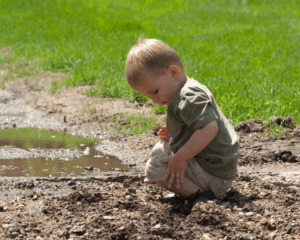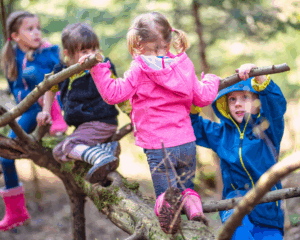Exploring with Confidence: Outdoor Learning and the Role of Risk-Aware Practice
There’s something magical about watching children explore the world outside, feeling the wind on their cheeks, splashing through puddles, and investigating bugs under logs. For early years professionals, outdoor learning isn’t just a trend, it’s a deeply valued part of how we support children to develop, connect and grow.
Outdoor learning has always held a special place in my heart. Growing up in an army family, we didn’t always have the same neighbourhood or the same friends, but we always had the great outdoors. Trees became climbing frames, fallen branches turned into den-building kits, and every day was an exploration mission. My parents had a saying they often shared with friends: “Kids can’t be kids until they’ve learned to fall out of trees.” That simple sentiment sums up how we experienced the world; hands-on, imaginative, and a little bit muddy.
Whether it’s a woodland wander, a garden den, or an afternoon at the beach, learning in the great outdoors offers children something unique.
In many ways, that grounding in outdoor play shaped how I see development and risk today. Not as things to avoid, but as experiences to guide and learn from. It’s why I feel so passionately about ensuring outdoor learning is not only encouraged but properly supported, both practically and through meaningful risk management. As someone working closely with providers across the UK, I’ve seen the powerful impact it has when children are given space to create, explore, and test their own boundaries.
But while the benefits are clear, the practicalities aren’t always straightforward. As with any area of practice, delivering outdoor learning safely and confidently requires thought, planning, and the right support, including from your insurance provider.
Why Outdoor Learning Matters
Outdoor learning nurtures resilience, curiosity, independence and joy. It supports early literacy and numeracy in meaningful, real-world contexts and gives children space to build physical strength, navigate risk, and develop social skills.
Across the UK, early years frameworks increasingly recognise the value of outdoor learning and encourage providers to make it a regular and meaningful part of children’s learning and development.
But stepping outside the classroom brings with it a different set of considerations. From changing weather conditions to public spaces and varied terrain, there’s more to think about in terms of safety, accountability, and responsibility.
Understanding Risk – Not Avoiding It
Risk is not the enemy of outdoor learning, unmanaged risk is. It can be a powerful tool for learning when it’s understood and appropriately managed.
Of course, letting children explore comes with responsibility. But risk doesn’t have to mean danger. It can mean freedom when managed well. It’s about equipping children to assess, adapt, and thrive, just as we did when balancing on logs or navigating nettles in makeshift jungle missions. That same principle underpins the way we think about insurance and support at Morton Michel – not as a constraint, but as an enabler of rich, authentic learning.
Many providers already carry out thorough dynamic risk assessments and put strong safety measures in place. But it’s also important to understand how your insurance interacts with this. Particularly when you’re heading beyond your premises.
For example, most specialist childcare insurance policies (Morton Michel’s included) will outline activity conditions (the key criteria that must be met for certain activities to be insured) or point to requirements such as obligations to take reasonable precautions to protect property and persons under your duty of care.
Activity conditions might include things like:
- Ensuring written risk assessments are in place for activities off-site or involving natural hazards
- Keeping to appropriate staff-to-child ratios
- Having parental permissions recorded
- Ensuring that activities are supervised and that any adventurous elements (like tree climbing or water play) are planned and age-appropriate
- Avoiding activities explicitly excluded (such as unsupervised access to deep water or using equipment beyond a child’s developmental stage)
These activity conditions aren’t there to restrict you, they’re there to support safe, confident practice and to ensure that if something does go wrong, you’re protected.
What Insurance Brings to the Table
Good insurance should never be a barrier to outdoor learning. It should be a quiet reassurance in the background. The right policy supports your ability to deliver varied, enriching experiences, while also recognising the realities of working with children in ever-changing environments.
Rather than seeing insurance as something separate from your pedagogy, think of it as part of your wider safeguarding approach, sitting alongside training, procedures, and reflective practice.
In short, when used well, insurance doesn’t limit your freedom to explore. It enhances it.
Tips for Safer Outdoor Learning
- Refresh your risk assessments regularly and adapt them to each site, activity, and not just the destination, but how you’ll get there and what you’ll do once you arrive.
- Review your insurance documents annually. Especially the section on activity conditions or exclusions. If you’re unsure about something, ask.
- Train your team to identify and manage risks dynamically, ideally covering a range of topics from weather shifts to wildlife encounters.
- Keep up-to-date records of permissions, accidents and near misses. These can highlight patterns and help inform future planning.
- Make time for debriefs after each outing. Consider what went well, what could be improved, and what learning was observed?
Working Together to Support Confident Practice
At Morton Michel, our aim is always to support best practice, not to tell providers what they can or can’t do. We understand that outdoor learning is not a one-size-fits-all activity, and we’re proud to work with settings who are as diverse in their approaches as the environments they explore.
That’s why we regularly review our policies to ensure they align with the evolving needs of the sector, including clarity around what is and isn’t covered, and support for off-site activities where they form part of your usual early years offer.
We also encourage providers to engage with their insurers proactively and not just when something goes wrong. A quick conversation about a planned activity or new approach can offer peace of mind and help avoid any surprises later on.
Let Nature Lead
The UK is rich in natural spaces, and early years settings across the country are making the most of them. From city-centre parks to woodland trails and coastal areas, there’s huge potential for children to learn through doing, moving, building, and imagining.
Let’s keep enabling those experiences, not by removing all risk, but by managing it thoughtfully, with professional confidence and support behind us.
After all, when children are free to explore, they flourish. And when providers are supported to deliver outdoor learning safely, the whole community benefits.
Bio – Gary Harrison, Head of Operations at Morton Michel.
With over 17 years at Morton Michel and more than two decades in the insurance industry, Gary is passionate about supporting the childcare and education sectors through meaningful, risk-aware partnerships. A champion of inclusive practice and sector innovation. Gary and his team at Morton Michel work closely with providers, policy experts and insurers to ensure that insurance reflects the real-world needs of early years professionals.








